|
9 (42) Gabriel's Hill
Maidstone
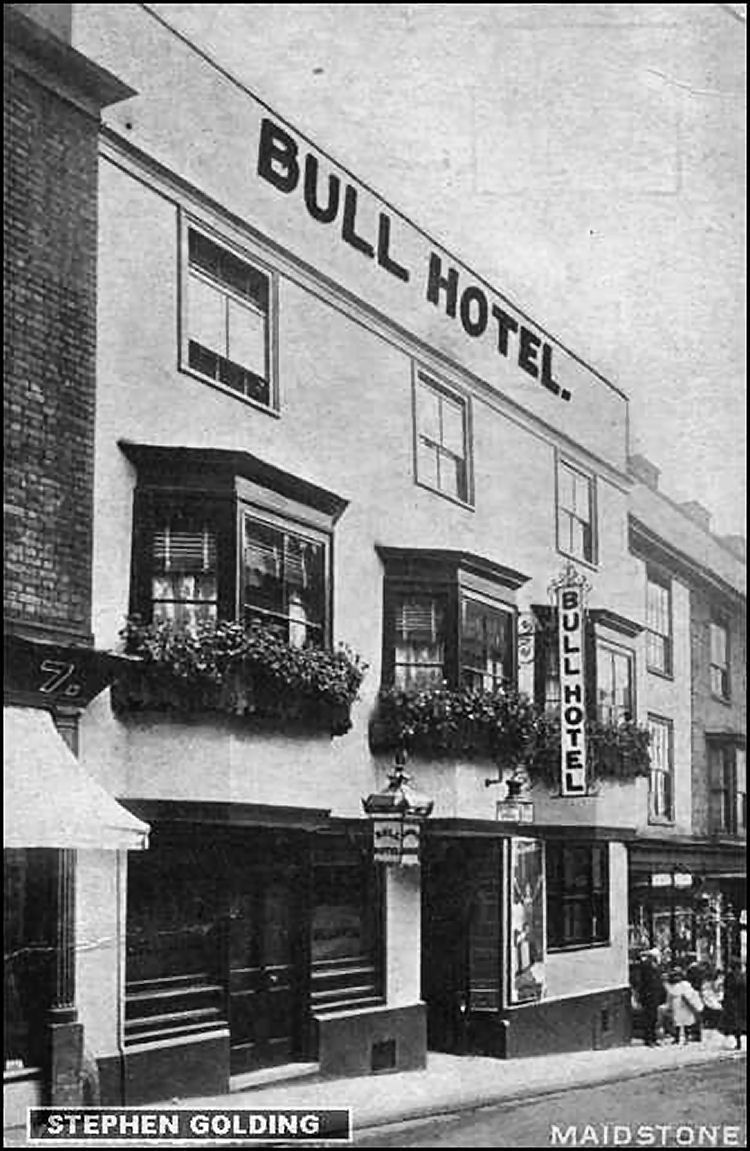
Above photo, date unknown, by kind permission of Maidstone Museum. |

Above photo, date unknown, by kind permission Stephen Golding,
http://www.kentphotoarchive.com |

Above photo, date unknown from Chris Carter. |
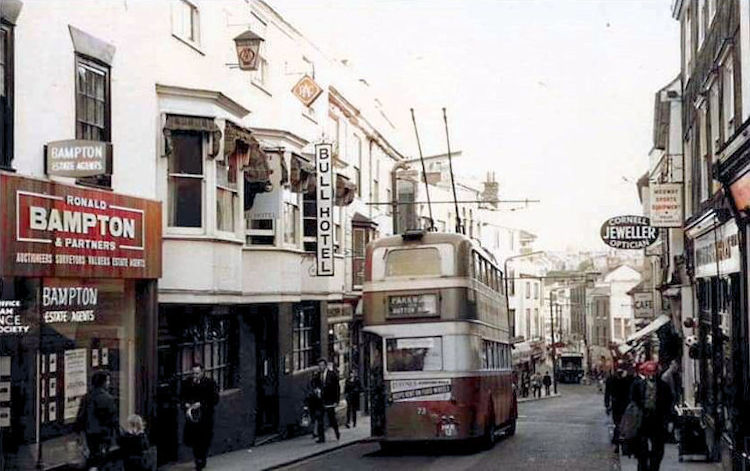
Above photo, 1959. |
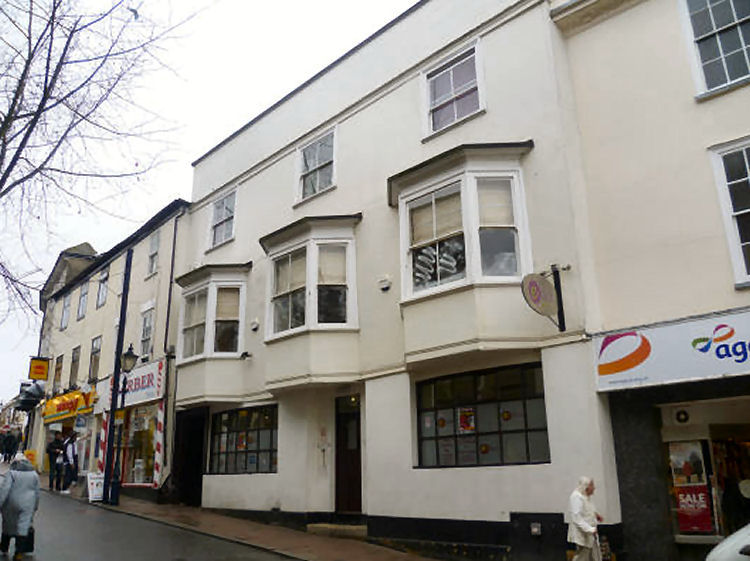
Above photo 2013. |
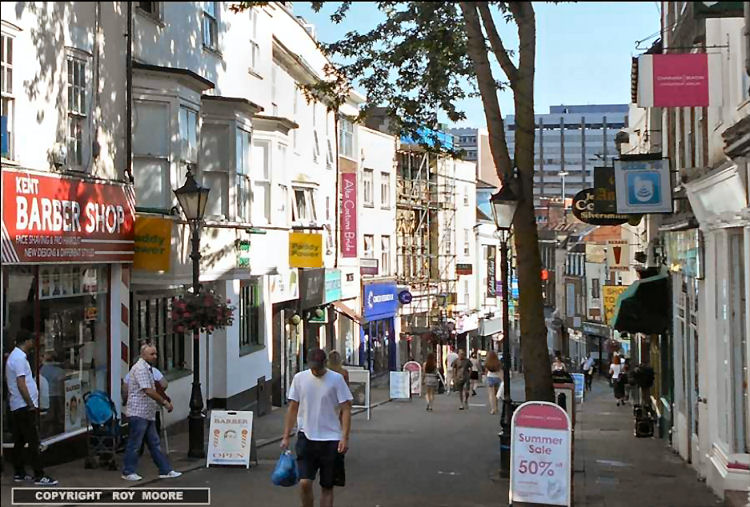
Above photo, 2014, by kind permission of Roy Moore. |
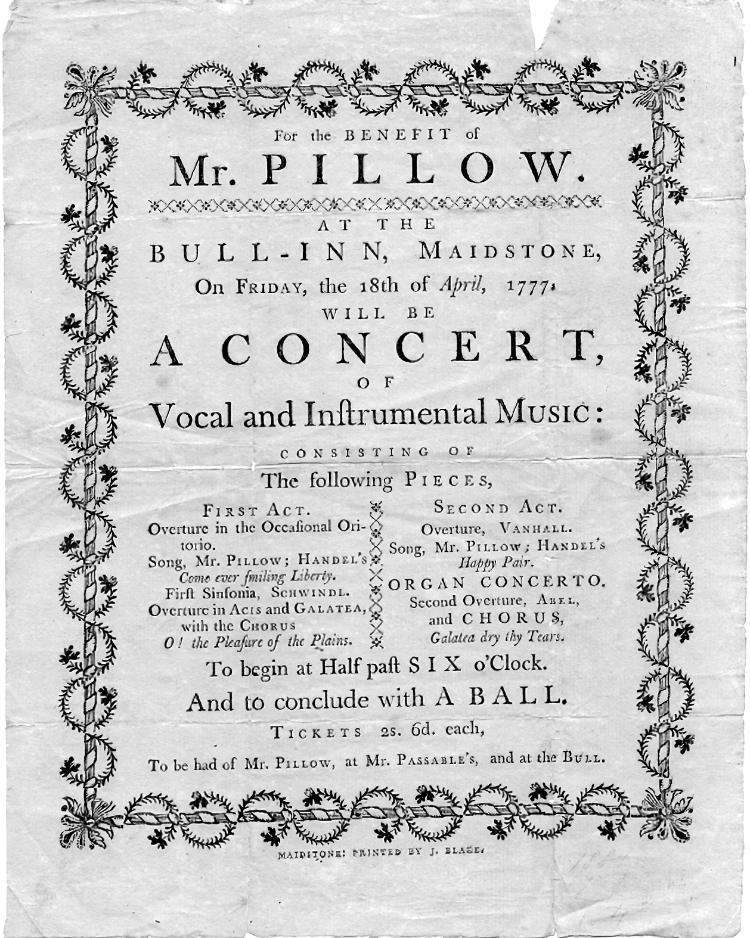
Above concert poster dated 1777, kindly sent by Wietske Laura Phillips. |
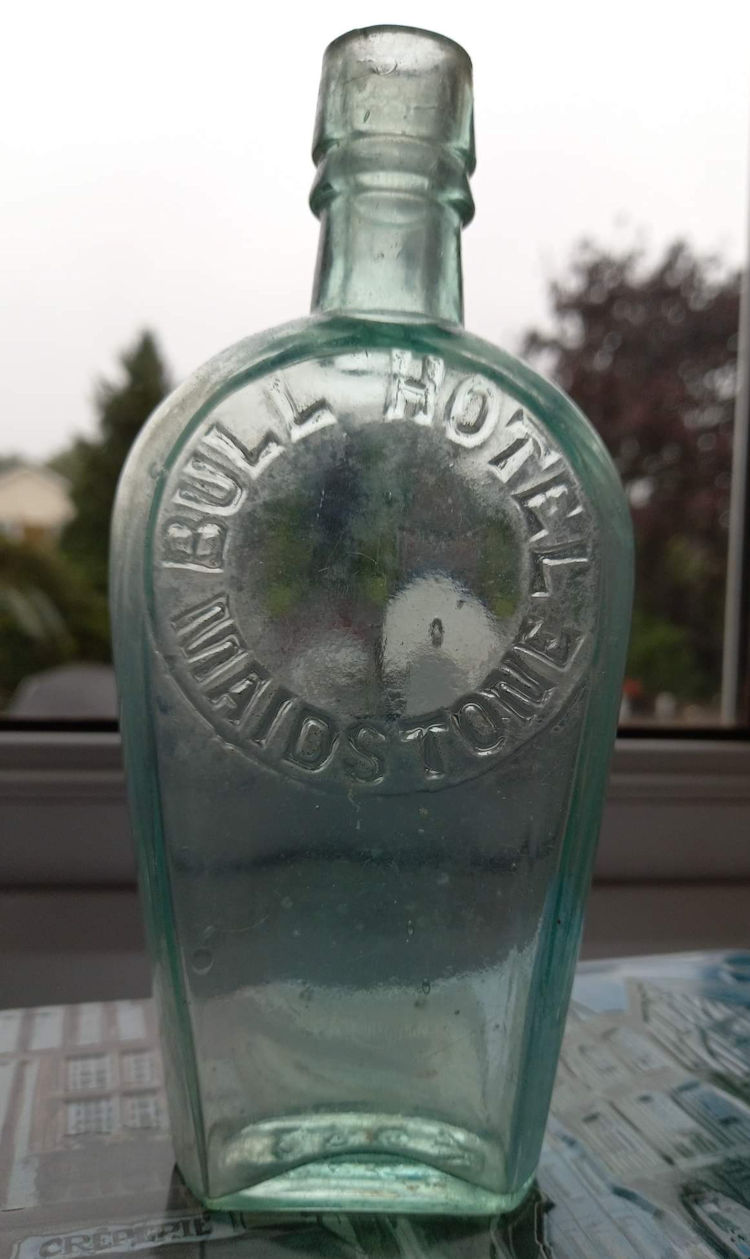
Above bottle, date unknown. |
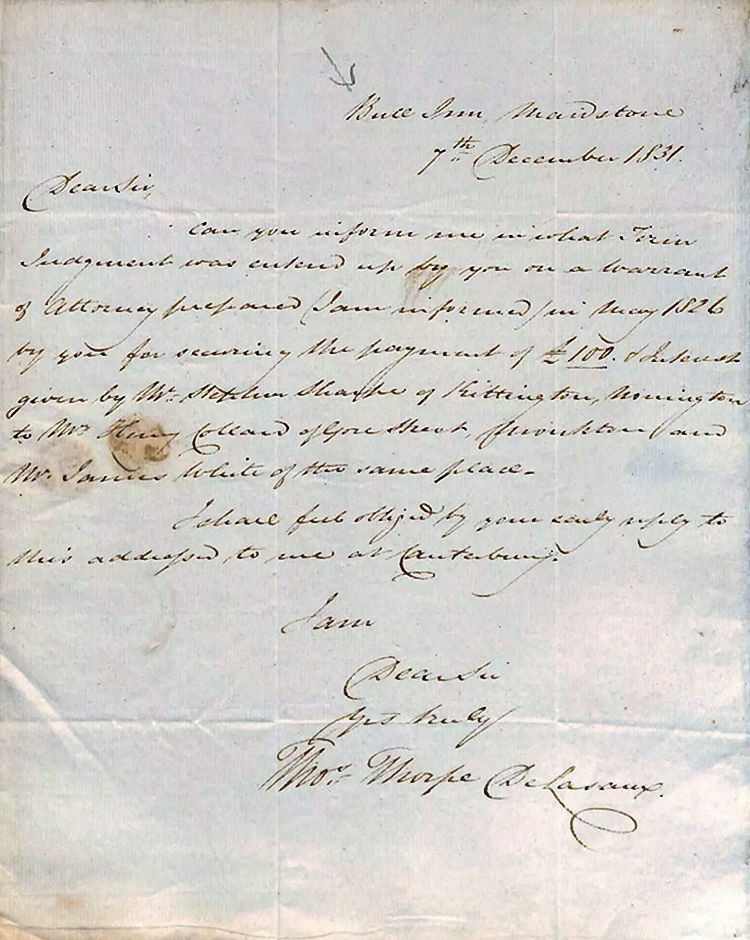
Above letter 1931, kindly sent by Rory Kehoe. A letter from the
Bull, apparently receipting the sum of £100 which, in 1831, was a lot of
money, being roughly three times the annual wage for an average worker. |
The "Bull Inn," one of five which once stood on Gabriel's Hill, was a
coaching inn during the 1700s, and recalls the days when a livestock market
was held in the town centre.
The premises was mentioned by local historian John Leland in 1538 as a
Commercial Inn, and also exists in the song, "The Maidstone Landlords" in
1798.
I am told that at the time of closing the premises had changed name to "Gabriels."
Then I believe also to the "Tutt and Shive," and lastly "Ethos Bar."
If anyone has photos of these in that guise I'd be very interested in adding
the photo thanks.
Supplied by Alfred Leney Co Ltd, who bought out Thomas Walker's Phoenix
Brewery in 1859 and registered as such in 1896, until bought out by Fremlin
Brothers brewery of Maidstone in 1926, brewing at the Dover brewery ceased
in 1927, which later passed to Whitbread.
As of December 2013 the premises was identified as the Paddy Power
betting shop.
|
From Kentish Gazette 27 July 1768.
JOHN OLIVER, (Late Steward to DAVID PAPILLON, Esq.)
Begs Leave to inform the Nobility, Gentry, and others, That he has taken
the "Bull Inn" at Maidstone, and fitted it up in the gentlest Manner
for the Reception of those who are pleased to favour him with their
Custom. He has likewise laid in a large Stock of the best Wines and
other Liquors. N.B. Post-Chaises, etc, on the shortest Notice to any Part of England. |
|
Kentish Gazette 23 October 1770.
Joseph Drywood, from Cranbrooke, Worsted and Yarn Maker, in Mill-Lane,
Maidstone. Advertising his products, also continues that he delivers the
Kentish Gazette every Tuesday & Saturday, setting out from his house or
the "Bull."
While delivering the papers he calls at the following named
Public-Houses, to collect parcels & orders.
The "Seven Stars" At Barmin, the "George" at Teason,
the "King's
Head" at Wateringbury, the "Buffalo's Head" at Mereworth, the "Kings
Head" at Hadlow, the "Rose And Crown" at Tunbridge, as also at the
Wells, the "Bull" at Sevenoaks, the "Crown
and Sceptre" at Seale, the
"George" at Ightham, the "Royal Oak" at Wrotham, the "Black Horse" at Offham, the "White Swan" at Townmalling, the "Ship" at Eastmalling,
and
the "Bull" at Larkfield.
|
|
Kentish Gazette, Tuesday 17 January 1797.
To be LET,
THAT well known Inn called the "BELL-INN, situated in Week Street,
Maidstone, Kent, late in the occupation of Mr. George Hopkins, deceased.
Its situation in the county town; its well known connection of trade
with the principal nobility and gentlemen on all public occasions —
makes it a very desirable situation for any person wishing to engage in
that line of business.
Further particulars may be known by applying at the premises, or to John
Whitehead, Esq. St. Margaret’s Bank, Rochester, or to Timewell Bentham,
Maidstone.
Immediate possession may be had.
|
|
Kentish Gazette 21 August 1801.
Monday se'nnight died, after a lingering illness, in the 70th year
of his age, Mr. J. Olliver, formerly of the "Bull Inn," Maidstone,
but had retired many years.
|
|
Kentish Gazette 2 April 1802.
A few days since died, after a long illness, Mrs. Bailey, wife of
Mr. William Bailey, at the "Bull Inn" Maidstone.
|
|
From the Kent Herald, 29 November 1827.
Sutton Valance.
Freehold Public House, Dwelling House and Stabling.
Two Substantial Brick-built Cottages, Wheelwrights Shop, Blacksmiths Forge,
Basket-makers Shop, and other Buildings.
To be sold by Auction, by Mr. I. B. Rouse. At the "Bull Inn," Maidstone, on
Thursday, the sixth day of December, 1827, at 3 o'clock in the afternoon, in two
lots, subject to such conditions as will be then and there produced, unless in
the mean time disposed of by private contract, of which notice will be given.
Lot 1:- All that Valuable and Desirable Freehold Timber-built, Free Public
House, or Inn, called or known by the name or sign of the "Plough," with the
outbuildings and appurtenances thereunto belonging, in the occupation of the
said I. B. Rouse.
Also all that Timber-built Messuage or Yenament, with the Wheelwrights Shop,
Blacksmith Forge, Basket-makers Shop, Stable, Outbuildings, Yard, Garden, and
appurtenances thereto belonging, in the occupation of Mrs. Suzanna Farrance,
widow, and her undertenants.
Lot 2:- All those two substantial Brick-built Messuages or Cottages, with the
appurtenances belonging, in the several occupations of Thomas Farrance, and
George Hollands.
The above property is most desirably situated at the Five Wents, in the pleasant
and fast improving parish of Sutton Valence, and offers a favourable opportunity
for occupation or investment.
For further particulars apply to Mr. D. T. Sweetlove, Solicitor, Queen Street,
Maidstone, or to the Auctioneer, at Sutton Valence.
|
|
From the Kentish Gazette, 16 October 1838.
DEATH.
Oct 7, aged 68, Mr. George Rachell, many years landlord of the "Bull
Inn," Maidstone.
|
|
From the Kentish Gazette, 12 February 1839.
DEATH.
Jan. 31, at Maidstone, Mrs. Hards, of the "Bull Inn," leaving a husband
and eight children.
|
|
Kentish Gazette, 3 August 1852.
Awfully Sudden Death.
On Wednesday a man named Arnold, died very suddenly. The deceased, was a
sherriff's officer, had been engaged at the Crown Court all day on
Tuesday, and in the afternoon complained of feeling unwell. He had
previously had an attack of apoplexy, and an Tuesday be expressed his
fears that he should have another attack. The unfortunate man lodged at
the "Bull Inn," he retired to rest at his usual hour on Tuesday night.
He got up on Wednesday morning, and went down stairs to breakfast, when
he was seized with apoplexy. The fits lasted for some time; the poor man
never recovered. He died about eleven o'clock on Wednesday morning.
|
|
Maidstone Journal and Kentish Advertiser, Tuesday 26 October 1852.
John Bates and Henry Rigden surrendered to their bail. They were charged
with having, on the 29th of September, assaulted John Jackson, parish
constable of Rolvenden, while in the execution of his duty.
Mr. Worsley appeared for the defendant's.
The constable having heard a disturbance opposite the "Bull Inn," close
to his own dwelling, went out with the intention of quelling it. he
found person's fighting and Bates appeared to be acting as second to
one of them. They were told to go away, but Bates put himself in a
fighting attitude. A man named Dewhurst said "For God's sake don't
strike him; he is a constable in the execution of his duty." This advice
had no good effect, however, for no sooner were the words uttered then
Rigden knocked the constable down. He was knocked down twice afterwards,
the last time by Bates. The constable used his staff liberally and the
prisoners had each of cracked crown on the occasion; they were
eventually locked up, with great difficulty.
Mr. Wolseley contended that the constable had overstepped his duty, and
brought the attack on himself by interfering without making it apparent
that he was a person in authority.
Guilty. 12 months imprisonment, and enter into sureties to keep the
peace for 6 months, themselves in £10 each, and two sureties of £10
each, and to be further imprisoned until the sureties are entered into.
|
|
Kentish Gazette, 27 June 1854.
Testimonial to Superintendent Turrall.
On Thursday last, a handsome testimonial was presented to Mr.
Turrall, Superintendent of the Bearsted division of police, at the
"Bull Inn," Maidstone. Mr. Turrall, it will he remembered, was the
means of breaking up a clever and daring gang of horse stealers, who
for years had pillaged the farmers of Kent, Surrey, Sussex, and
Hampshire, with impunity.
|
|
From the Maidstone Telegraph, Saturday 1 January, 1859. Price 1d.
ACTION FOR SLANDER Morrell v. Baker
This case was tried before the Guildhall, London, last week, before Lord
Campbell.
Mr. Chambers, in opening the case, said that the plaintiff and defendant
were medical practitioners, and had not been on very good terms. It
appeared that in 1857 Mr. Morrell took a business at Cranbrook, and in
March, 1858, Mr. Baker succeeded to a practice in the same town. In the
beginning of June last, Mr. Baker hinted to Dr. Dunhill that Mr. Morrell
was not a licentiate of the Apothecaries' Company, and his name only
appeared as surgeon in the Medical Directory in 1853; and on the 24th
June, at a meeting at the “Bull Inn,” Mr. Baker made use of words,
signifying that the plaintiff was an unqualified person; in consequence
of which the present action had been brought.
Mr. John Morrell, the plaintiff, said, he became a licentiate of the
Apothecaries Company in 1855, and a member of the College of Surgeons in
1840, and in 1857 he purchased a practice from a Mr. Blackwell, in
Cranbrook, for £85. In March last, Mr. Baker succeeded to another
practice, he did not, as is usual, call upon him. At the “Bull Inn,” on
the 24th June, there was a meeting with respect to forming a doctor's
club, in connection with the Cranbrook Provident Institute, at which he
attended, and on being called to make his proposition, was about stating
his intentions with respect to the club when Mr. Baker entered the room.
He approached the table in a very excited manner and said, before the
proceedings went any further he would make a few observations, when he
said that he (the plaintiff) was an unqualified practitioner, and quite
incapable of taking this club; and wondered how he could have the
impudence to show his face in the room, knowing that he was not a
legally qualified man, which he could prove by a book he (the defendant)
then held in his hand, in which his name was down only as “John Morrell,
Surgeon;” and further stated that he never looked upon him as a
respectable, qualified practitioner, and would not take the slightest
notice of him; whereupon the members put it to the vote and that he (the
plaintiff) should leave, and he left in consequence; Mr. Baker
remaining. Subsequently a correspondence took place between the
attorneys, with a view to settle the matter, and the present action was
brought. An execution had been put into his house, and all the goods
were sold in consequence, and he then went to stay at Dr. Jobsons.
Cross-examined:- have a reason to declining to state where I now reside.
Had drawn up an apology, but Mr. Baker refused to sign it. I
subsequently went to another firm in London, but they refused to act,
and I then employed my present attorney. Had practiced at Carshalton;
but refused to say why he left. Had never told Mr. Dunk, a tailor,
living at Cranbrook, that I refused to pay his bill until I had my
damages in the action.
The correspondence with Mr. Baker was then read, and it appeared that
the plaintiff drew up an apology, in which Mr. Baker was to confess that
he had made a most unwarrantable and slanderous attack upon the
plaintiff, and to retract everything of an injurious nature which he
might have said against him; and also to confess that all he had said
was wholly without foundation, and had just reason to consider that Mr.
Morrell was a duly qualified and honourable member of the medical
profession. To which Mr. Baker replied that to such an apology no
gentleman could affix his name; but would sign an apology dictated by
any respectable attorney, admitting that he had made an erroneous
statement.
Mr. Macauley in addressing the court, contended that it was a shabby
action on the part of the plaintiff, who was not entitled to damages to
pay his debts.
Mr. Thomas Baker, the defendant, said he was first qualified as a
medical man in 1833, and had practiced since in Bristol and Hampshire.
On the 2nd June he called upon Mr. Dunhill and asked him to join with
him in a letter to the Apothecaries' company, to interfere with Mr.
Morrell. Mr. Dunhill said, “Is he not duly qualified,” and I said I
believe he was not, for I could not find his name among the list of
apothecaries as late as 1853, to which Mr. Dunhill replied that he
should not interfere; he could not get more than £100 a year, let him
alone, and he would soon work himself out. Mr. Morrell was speaking when
he (the defendant) entered the room and walked quietly up to the table,
and said that he believed (Mr. Morrell) was not a duly qualified
practitioner, and the book he then held in his hand would prove it. Mr.
Morrell said, “You're a liar.” A member was then voted to the chair, and
a motion was carried that he should withdraw.
Cross-examined:- had written to Mr. Davis, at Weston-Supermare, and a
few days afterwards heard that an execution had been put in and Mr.
Morrell was sold up.
Lord Campbell, in summing up, remarked that the plaintiff and the
defendant did little credit to their profession, and that defendant had
acted most unjustifiably in endeavouring to persecute the plaintiff, and
injure him in his profession. On the other hand, the plaintiff was a
rolling stone, and his antecedents did not appear very distinctly. He
had refused the defendant's offer of conciliation, and proposed to him
such an apology as would have most likely blasted the defendant's
reputation for life had he signed it. He Lord Campbell thought that if
they found a verdict for the plaintiff small damages would suffice.
The Jury then returned with a verdict for the plaintiff, damaged £50.
|
|
Kent Times, 19 April 1862.
Montague v. Relf.
This was an unsatisfied judgment summons. Plaintiff is the landlord
of the "Bull" in this town, and the defendant is a bootmaker at
Maidstone. Plaintiff stated that the claim, £2 19s. 1d., was for
money lent in 1856. Defendant pleaded that illness had prevented him
from paying. His Honour adjourned the ease until next Court day
telling the defendant that failing to pay he would be committed.
|
|
Local News on this day 3rd February 1863.
At the Maidstone Police Court on Saturday 31st January, before the Mayor
G. Edmett. Michael Fitzpatrick, who stated he came from Liverpool, was
charged with stealing from Mrs Emily Benze, a gold watch chain, with the
following appendages:- two gold seals marked "E.B", a plain locket set
with hair with the initials "H.C.A.K", a gold key, an eye glass, a gold
clasp and a gold oval ring, attaching the chain to the watch. The
prisoner, who was a deserter, was described as a sullen and dissipated
looking fellow. He was remanded on Wednesday, to allow Superintendant
Blundell to make enquiries and to ascertain, whether there were any
other charges to be preferred.
Mrs Emily Benze deposed that on the Tuesday, at about 12.30, she was
standing outside the shop of Mr Grundy, Bank Street, looking at some
pictures she was about to buy her daughter, when the prisoner came close
to her side and made a grasp at her watch chain. The prisoner
immediately ran off, and she gave the alarm to some people who were
standing close by. The prisoner was followed and finally captured in the
yard of the "Bull Inn," King Street.
Edward Robins "Boots" at the "Bull Inn," deposed that the prisoner,
followed by another man, came running down their yard and thinking that
something was wrong, he stopped the prisoner outside the kitchen window,
when he began to show fight, and afterwards got a cracked bottle in his
hand, threatening to strike anyone who dared to stop him. A policeman
then came up, when the prisoner tried to make his escape and threw
something behind a door. After the policeman had taken him into custody,
the witness looked behind the door and found a part of the chain
produced, which he afterwards gave into the hands of the police. P.C.
Richard Sunnucks, who apprehended the prisoner, stated that he made a
careful search in the "Bull" yard for the stolen articles, and had made
enquiries at Mr Grundy's, but could not find them.
The prisoner, who made no defence, and refused to sign his name or put
his mark to the paper, usually signed by prisoners, was committed for
trial at the Assizes.
At the Lent Assizes, he was sentenced to four
years' penal servitude and one of the witnesses in the case, Edward
Robins, after leaving the court, fell down and fractured one of his
legs.
|
|
From the Southeastern Gazette, 13 March 1866.
DEATH.
On the 5th inst., at Gabriel’s-hill, Maidstone, John Alfred Tanton, son
of Mr. W. G. Tanton, “Bull Hotel,” aged 17 months.
|
|
From the Southeastern Gazette, 26 June 1866.
Transfer of Licenses.
The licenses of the following houses were transferred at the Maidstone
Petty Sessions on Saturday:—
The “Bull Hotel,” Gabriel’s-hill, to Mr. Tanton.
|
|
|
LICENSEE LIST
REEVES Mr 1720+
HOLLINSWORTH John 1774+
OLIVER John 1768+
LAMPREY John 1791+
HOPKINS George to Jan/1797
BAILEY William 1802+
SIMONDS Joseph 1811+
RACHELL George 1826-Oct/38 dec'd
 
JURY Henry 1840-58+ (widower also land agent appraiser age 56 in 1851 ) )
MONTAGUE ???? 1862+
TANTON William George 1866-67+ (also saddler)

AMBROSE William 1871 (age 57 in 1871 ) )
WYBURN Frederick E 1881-91 (age 53 in 1871 ) )
PETTITT Sarah 1891+ (age 40 in 1891 ) )
COLE James 1899-1904+ (also Wine & Spirit Merchant)
RUSSELL William 1911+ (age 51 in 1911 ) )
EFFORD William John 1913-30+
SQUELCH Kate Mrs 1938+
https://pubwiki.co.uk/BullHotel.shtml
 From the Pigot's Directory 1832-33-34 From the Pigot's Directory 1832-33-34
 Kentish Gazette Kentish Gazette
 Census Census
 From
the Post Office Directory 1867 From
the Post Office Directory 1867
|








